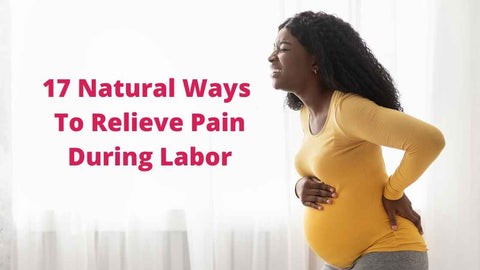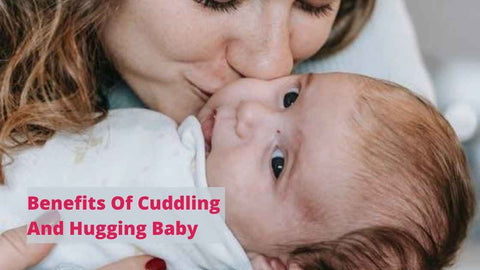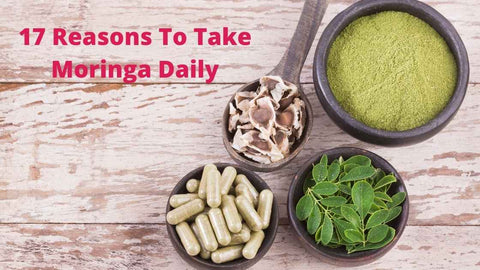Pregnancy and Acne
At some time during pregnancy, you may experience pregnancy acne.

Pregnancy acne is completely normal. It is a common occurrence during the first and second trimesters. Pregnancy acne is a sign of a growing baby but it can be annoying to some extent.
...more than one out of two pregnant women can expect to develop acne...
(Source)
What Is And What Causes Pregnancy Acne?
During pregnancy, your body produces a hormone, called androgen, in high quantities. Due to this extra androgen, glands in your skin called the sebaceous glands, produce more sebum.
Sebum is an oily, waxy substance that lubricates the hair and skin of mammals. This is not typically a problem, but this oily and waxy substance in high doses, can clog the pores in your skin trapping dirt and bacteria along with it. This buildup of dirt and bacteria leads to inflammation and breakouts on the skin resulting in acne.
If you experience acne during the menstrual period chances are there that you may also have acne during pregnancy. Just like your skin gets clear after your menstrual cycle, pregnancy acne is also temporary and fades away after some time.
In this article, you are going to learn some very important facts about pregnancy acne. We are also going to tell you how you can treat pregnancy acne.
Let’s get started...
If you're prone to acne like me, then you would be wondering: Where does pregnancy acne show up? Where does pregnancy acne occur? Or even, what week does pregnancy acne start?
Where is Pregnancy Acne located?
Pregnancy acne may occur on any part of your body, at any time during pregnancy. However, these breakouts are more common during week 6 of pregnancy.

As the progesterone level increases in a pregnant woman, it causes excessive secretion of sebum. And as discussed earlier, this extra sebum can clog the pores of the skin where bacteria start building up resulting in pregnancy acne.
When Does Pregnancy Acne Start?
In the first few weeks of pregnancy, your body becomes very sensitive as you experience physical and emotional changes. So besides wondering when it starts, I’m sure your next question is: how long does pregnancy acne last?
Pregnancy acne can start at any time during pregnancy. Most women experience it during the early stages of pregnancy, around the 6th week.
This acne can last throughout the pregnancy but in some cases, the blemishes clear up during the third trimester. If acne doesn’t occur during the first trimester, there is a chance that you might not develop it throughout your pregnancy.
How to Treat Pregnancy Acne
When you are pregnant it is just as important to be careful about what you use on your body as what you put into your body. The following are some tips on how to deal with pregnancy acne:
Use a Facial Cleanser:
Face cleansers are the best defence against pregnancy acne. During pregnancy regular cleansing is very important. Clean your face twice a day with a good quality cleanser that is gentle on the skin.

Make sure that you wash and rinse your face properly, especially the areas of your face where you are prone for the pores to get clogged.
Avoid Too Much Washing
Avoid over-washing, as your skin may lose its natural moisture and elasticity that leads to breakouts. Scrubbing and squeezing pimples or blackheads are also not healthy for you. Squeezing your pimples during these days can make the zits last longer and result in scars.

Moisturize Your Skin:
To reduce the irritation from dry skin, use an oil-free moisturizer. Don’t use harsh acne soaps as they make skin drier and can result in breakouts.
Use Oil-free Skin Products:
To avoid acne in pregnancy, use oil-free skin and hair care products. Products that have a non-acnegenic label on them are more effective for you.
Keep your Skin and Hair Clean:
Washing your face twice daily reduces the chances of breakouts during pregnancy. In addition to keeping your face clean you should also take care of your hair.
Wash your hair regularly to avoid excessive sebum on your scalp. Your pillow covers, towels, or anything that you use for hair should be clean and dry.
Include Vitamins In Your Diet
Include the maximum amount of vitamins in your diet. Vitamin A is essential for acne treatment and it will be beneficial for you and your baby’s health. Vitamin A is used in many beauty products because it keeps the skin healthy.

You can include vitamin A-containing foods in your diet. Foods like milk, eggs, carrots, and fish have sufficient vitamin A. Always consult your health care provider if you want to take any supplements of Vitamin A.
Avoid Too Much Stress
Not only during pregnancy, but the stress in normal everyday life, can also result in pimples. In pregnancy, when all of your hormones and responses are heightened, stress can easily lead to acne. So avoid taking on too much stress and try to stay calm and happy.
Drink A Lot of Water
Drinking a lot of water helps your skin stay hydrated and moist. Thus, it results in lower chances of pregnancy acne, and breakouts.
Include Wholesome Foods to Your Diet
To prevent acne in pregnancy, you must take care of your diet. Sugar and refined grains can make the situation worse.
Change your diet from sugar and junk food to whole grains, fruits, vegetables, nuts, and fish. Pure dark chocolate is also helpful to prevent acne during pregnancy.
Natural Remedies for Pregnancy Acne
When it comes to pregnancy, pregnant women are very cautious about their health and their baby. Any harmful chemical or toxic substance can result in many complications. Although there are many cures for acne in pregnancy you cannot take any risks. Instead of using harmful chemical products for acne, it is better to use natural remedies for pregnancy acne.
If you don’t want to apply or use the typical beauty products, you can try these natural remedies to reduce the chances of pregnancy acne.
Apple Cider Vinegar With Distilled Water
Don’t use apple cider vinegar on your skin directly as it is very acidic and can result in burns. You need to make a solution of apple cider vinegar with distilled water.
Preparation of the solution
For the solution, you need one part raw and unfiltered apple cider vinegar and three parts distilled water. This toner is enriched with naturally occurring enzymes and alpha hydroxy acids that are very good for your skin.
How to apply?
Take a small cotton ball and soak it in the apple cider vinegar mixture. Gently apply it to your skin to absorb the excess oil.
If you feel that your skin is getting excessively dry, you should stop the treatment.
Baking Soda With Water
Baking soda is another essential substance that is used to dry out the oil from your skin and promote healing. Baking soda is mostly used as a spot treatment.
It is not suitable for everyone and is not recommended by skin care professionals. It can irritate the skin and remove the protective oil from the skin.
Formation and Application
To use, mix one tablespoon of baking soda with 1 tablespoon of water. Applying this mixture to the pimple directly will minimize their appearance. Let the mixture dry completely before rinsing.
Citrus Fruits
Citrus fruits like lime and lemons contain alpha hydroxyl acids. This alpha hydroxy acid helps to remove dead skin cells and unclog skin pores.

Applying lime or lemon juice to your skin helps to reduce the chances of acne. The antibacterial and astringent properties of citrus fruits make them excellent exfoliates. Their use also gives a glowing and younger appearance to your skin.
Directions for use
For application, squeeze the lemon or lime and apply the juice directly to the acne spots using small cotton balls. Wait for the mixture to dry completely and rinse with cool water.
Pure Honey
The antibacterial and antiseptic properties of honey make it the first choice for most people. It leaves a soothing effect on your skin and gives it a glowing, younger, and healthier look.

How to Apply?
Before applying honey, rinse your face properly with warm water. You can directly apply honey to your skin as it has no side effects and is very gentle on the skin.
After applying, wait for at least 20 to 30 minutes so the skin absorbs the honey. Use warm water for rinsing and cleaning honey.
Virgin Coconut Oil
Coconut oil is another naturally occurring substance that is very helpful to reduce acne during pregnancy. Coconut oil has remarkable antibacterial and anti-fungal properties.

It has no side effects, absorbs in the skin easily, and leaves a soothing effect on your skin. All these characteristics make it a wonderful choice to be used for reducing acne. You can change your nighttime moisturizer with virgin coconut oil for the treatment of acne.
Cucumber and Oatmeal
Cucumber and oatmeal are used for inflammation and breakouts. They leave a cooling and soothing effect on the inflamed patches of skin. Cucumber and oatmeal masks are very helpful and effective to minimize acne during pregnancy.
Precautions to Avoid Pregnancy Acne
If you haven’t developed acne during early pregnancy yet, you can take some precautionary measures to avoid it throughout your pregnancy.
Follow these easy and simple precautions to avoid acne during pregnancy:
- No matter how tempting you find it, never pop, squeeze, or scratch your acne sores.
- If you are fond of coffee, then there is some bad news: consuming lots of caffeine can result in an outbreak during pregnancy. Therefore, avoid too much caffeine and carbonated beverages during pregnancy.
- Avoid touching your face and wash your hands, face, and hair regularly to keep the bacteria, dirt, and oil off your face.
- Remove make-up before going to bed.
- Change your pillowcase more often and use clean and dry towels.
Conclusion
Ok, so there you have it. Remember, even though this can be annoying, it will soon be over as your hormones normalize. Take precautions to avoid the chances of getting pregnancy acne and keep your skin healthy.
Here’s to your happy healthy pregnancy.



